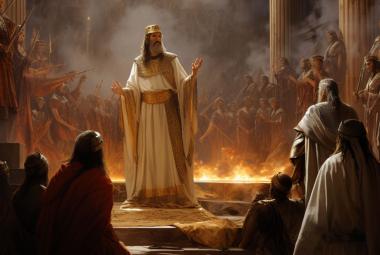On March 31, 1492, the Spanish monarchs Ferdinand and Isabella issued a royal decree that all Jews must leave the Spanish territories within four months. If they were found in Spain after this period they were to be killed. This deadline was later postponed to August 3rd.
Boarding their ships before the deadline, at midnight August 2nd, Columbus and his crew set sail at dawn. On the Jewish calendar, it happened to be the 9th of Av, or Tisha B'Av.
This peculiar date on the Hebrew calendar seems to be a date of destiny. On the 9th of Av in the year 586 B.C., Nebuchadnezzar destroyed Solomon's Temple and deported the inhabitants of Jerusalem to Babylon.1
In 70 A.D. the Romans destroyed the Second Temple, unknowingly fulfilling Jesus' predictions.2 Again, the date on the Hebrew calendar was the 9th of Av.3
After being delivered from Pharaoh's slavery in Egypt through the Red Sea, and arriving at Kadesh-Barnea but lacking the faith to enter the Promised Land, God decreed that that generation would never enter His Land. It seems that this, too, was on the 9th of Av.4
The famous Bar Kokhba revolt against the Romans was squelched when Bethar, the last stronghold of the Jewish leaders, fell in 135 A.D. The date was the 9th of Av.5
One year later, in 136, the Roman Emperor Hadrian established the heathen temple to Jupiter on the site of the Jewish Temple and rebuilt Jerusalem as a pagan city named Aelia Capitolina, and renamed the land as Palestina, to distance its Jewish heritage. (This attempt to disavow the land from its Jewish roots was echoed by the British in their labeling the land "Palestine.") The date when the Temple area was plowed under by the Romans was, again, the 9th of Av.
Thus the 9th of Av, Tisha B'Av, has become a symbol of all the persecutions and misfortunes of the Jewish people, for the loss of their national independence and their sufferings in exile. The numerous massacres of whole communities during the Crusades also intensified this association.
After the Babylonian exile, the Prophet Zechariah discusses the "Four Fasts": the Fast of the Fourth (month of Tammuz), the Fast of the Fifth (month of Av), the Fast of the Seventh (month of Tishri), and the Fast of the Tenth (month of Tevet). The Lord instructs them that, instead of a day of mourning, instead of fasting they should love truth and peace since the former days would ultimately become days of joy and gladness.
Thus saith the LORD of hosts; The fast of the fourth month, and the fast of the fifth, and the fast of the seventh, and the fast of the tenth, shall be to the house of Judah joy and gladness, and cheerful feasts; therefore love the truth and peace.
Zechariah 8:19
(The Fast of the Fourth, the 17th of Tammuz, commemorated the occasion when Moses discovered them worshiping the golden calf and broke the two tables of the law. The Fast of the Seventh, the 3rd of Tishri, is the Fast of Gedaliah, commemorating the assassination of the governor appointed by Nebuchadnezzar to govern the Jews who remained in their homeland after the Temple had been destroyed in 586 B.C. The Fast of the Tenth, the 10th of Tevet, was for the day that Nebuchad-nezzar laid siege on Jerusalem.)
Since the regaining of the Old City-Biblical Jerusalem-in 1967, there have been subtle modifications, by some, to the traditional rituals associated with Tisha B'Av as a day of mourning. The Jews are in Eretz Israel, although the Temple is not (as yet) rebuilt.
This year, the "Ninth of Av" falls on August 12th, and our Jewish friends will be observing this unusual day of mourning-yet subtly tinged with joy and promise. (For some, a nine-day series of observances begins nine days earlier.6 ) The Sabbath before Tisha B'Av is called Shabbat Hazon, the Shabbat of Vision (from the comfort in Habakkuk 2:3). While the orthodox in Jerusalem will be circling the walls of the Old City to remind themselves of their tragic history, they will also be looking toward the ultimate rebuilding of the Temple.
We do know that the Temple will be rebuilt because Jesus, John, and Paul all make reference to it.7 But we also know that this Temple will be desecrated by the Coming World Leader when he sets himself up to be worshiped.8
Will this prophetic milestone event also turn out to be on Tisha B'Av? Is this also on our not-too-distant horizon? Let's just watch and see.
Notes:
- According to Jeremiah 52:12, it was the 10th of Av; according to 2 Kings 25:8, it was the 7th. The Tosefta Ta'anit 4:10 (also Ta'an 29a) explains this discrepancy by stating that the destruction of the outer walls and of the courtyard started on the 7th, while the whole edifice was destroyed on the 10th.
- Luke 19:43-44 and Daniel 9:26. See Daniel's 70 Weeks briefing pack.
- Josephus (Wars, 6:249-50) gives the date as the 10th. The Talmud (Ta'an 29a) gives the date as the 9th, which has become the accepted date of both destructions.
- Numbers 14. Also, Mishnah (Ta'an 4:6).
- Encyclopedia Judaica, vol. 3, p.936.
- From the Talmud (Ta'anit 26b).
- Matthew 24:15; Revelation 11:1, 2; 2 Thessalonians 2:4; et al.
- 2 Thessalonians 2:3-4.






